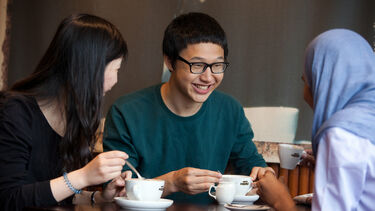I gained hands-on lab experience

I’ve always loved biology and knew I wanted to do some form of medical research eventually. It was only when I was in Year 12 and doing a project on the future of whole organ transplants that I came across bioengineering.
I was fascinated by it, but I never really thought it was something I personally would be able to do.
However, after coming to an open day at 91̀½»¨ and speaking to some students and staff about the Bioengineering course, it really gave me the confidence to just go for it.
A highlight of the course has been undertaking a summer internship with one of my professors, working on the fabrication of polymer nerve guide conduits for the repair of peripheral nerve injury.
Alice Hann
Bioengineering MEng
I’ve really enjoyed the wide variety of modules I’ve had the opportunity to study.
Coming from almost no physics background, I would have never imagined myself studying subjects such as coding, electrical engineering and mechanical engineering. Luckily, I found that our lecturers are always so helpful and willing to go above and beyond in order to support us through when we need help.
Although now I’ve chosen to go down the more biology-based Tissue Engineering stream, I feel like the vast range of subjects I’ve studied have given me a much broader perspective.
A highlight of the course has been undertaking a summer internship with one of my professors, working on the fabrication of polymer nerve guide conduits for the repair of peripheral nerve injury.
This allowed me to get hands-on lab experience, whilst working on something meaningful which is at the forefront of bioengineering. It was a great opportunity for me to put what I’d learnt so far in my degree into practice and I thoroughly enjoyed every second of it.
After graduation, I’m hoping to go on to do my PhD but I am still currently keeping my options open. My summer internship definitely made me realise I eventually want to go on to research, most likely in biomaterials and regenerative medicine.
The STEM Awards
In my third year, a friend and I decided to enter The STEM Awards, a competition run by The Telegraph and GSK. We had the brief of coming up with a novel way of tackling pneumonia in developing countries and writing a 1,000-word proposal.
Our idea involved the use of genetically engineering bacteriophages that could target even antibiotic-resistant strains of pneumonia, whilst being cheap, safe and easy to store. We were one of five teams that made it to the semi-finals, where we had to do a 20-minute presentation in the London headquarters of GSK.
Although we didn’t win, it was an amazing experience for both of us, that has really helped to build my confidence and develop my presenting skills. I would recommend any student that was thinking of entering to just go for it. There are a few different categories, with very broad briefs designed to allow you to get creative and think outside the box.

International undergraduate scholarships
We offer a generous package of financial support for international undergraduate students, including scholarships worth £10,000 towards the annual tuition fee.
Applications are open for existing offer holders for an undergraduate degree programme starting in autumn 2025.
